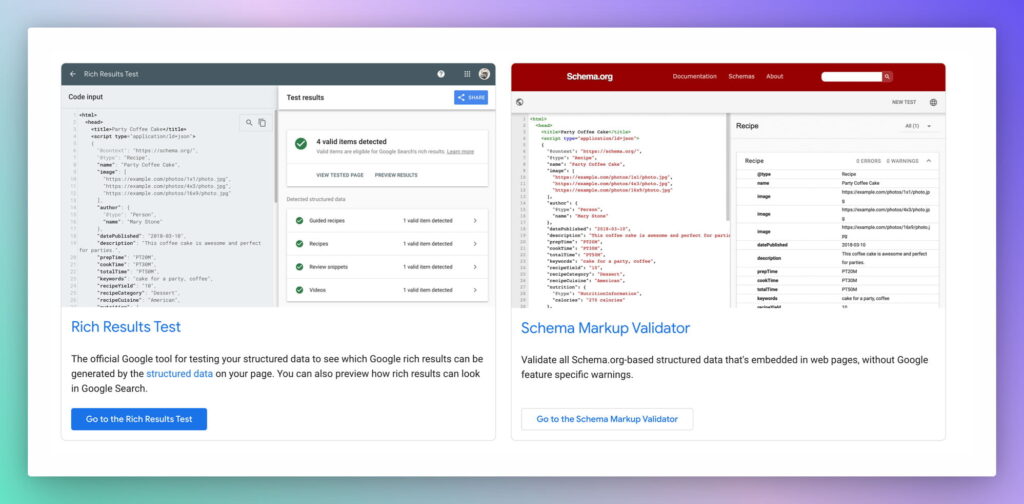Structured data help improve SEO by making it easier for Google to comprehend the content and purpose of your pages, products, and website. This information is crucial for Google to accurately display your site in search results. It is like providing Google with a clear explanation of your website’s subject matter.
Structured data, also known as schema markup, is a type of code added to a website to help search engines better understand the content on the page.
It provides additional information about the website and its content, such as the type of content, the author, and the date it was published.
Search engines can then use this information to display rich snippets in search results, which can improve the visibility of a website and ultimately drive more traffic to the site.
Site visibility
One of the most important benefits of using structured data is that it can help improve a website’s visibility in search results.
By providing additional information about the content on a page, search engines can display rich snippets in search results that include the author, content publication date, and even the rating of a product or service.
This can make it more likely that a website will be clicked on in search results, ultimately driving more traffic.
User experience
Another benefit of structured data is that it can help to improve the overall user experience.
By providing additional information about the content on a page, users can better understand what the page is about before they click on it.
Hence it can reduce bounce rates and improve overall engagement on a website.
Helps your SEO efforts
In addition, structured data helps improve the search engine optimization of a website.
By providing additional information about the content on a page, search engines can better understand the relevance and authority of a website.
This can help improve a website’s overall ranking in search results, ultimately driving more traffic.
Types of structured data
Several structured data types can be applied to a website, including microdata, RDFa, and JSON-LD.
Microdata is the most commonly used structured data type supported by all major search engines.
It is a simple, easy-to-use format that can be added to a website using HTML. RDFa is another popular format that uses HTML to add structured data to a website.
JSON-LD is a newer format that uses JavaScript to add structured data to a website.

When implementing structured data on a website, ensuring the code is valid and implemented correctly is crucial.
You can verify it using the Google Structured Data Testing Tools, which can help ensure that the code is correct and that search engines correctly interpret it.
Here are a few examples of how structured data can improve SEO:
- Product Markup: e-commerce websites can use structured data to provide additional product information, such as the price, availability, and ratings.
- Local Business Markup: Local businesses can use structured data to provide additional information about their location, such as the address, phone number, and operating hours.
- Event Markup: Websites that promote events can use structured data to provide additional information about the event, such as the date, location, and ticket information.
- Recipe Markup: Food blogs or recipe websites can use structured data to provide additional information about the recipe, such as the ingredients, cooking time, and ratings.
- Article Markup: News websites or blogs can use structured data to provide additional information about the article, such as the author, the date published, and the image.
- Job Posting Markup: Websites that post job listings can use structured data to provide additional information about the job, such as the job title, location, and salary.
- Music Markup: Music websites can use structured data to provide additional information about their music, such as the artist, album, and track information.
- Video Markup: Websites that host videos can use structured data to provide additional information about the video, such as the title, description, and duration.
- Book Markup: Book websites or online bookstores can use structured data to provide additional information about the book, such as the title, author, and ratings.
- Review Markup: Websites that provide reviews of products, services, or any other type of content can use structured data to provide additional information about the reviews, such as the author, date, and ratings.
These are just a few examples of how structured data can improve SEO.
By providing additional information about the content on a website, structured data can help improve the website’s visibility in search results and drive more traffic to the site.
Closing thoughts
In conclusion, structured data plays a vital role in SEO by providing search engines with additional information about the content on a website.
This can help improve the visibility of a website in search results, the user experience, and the overall search engine optimization of a website.
Please note that the structured data should be implemented correctly and is valid to get the maximum benefits.
As search engines evolve and become more sophisticated, structured data will become even more critical in helping websites achieve higher rankings in search results.